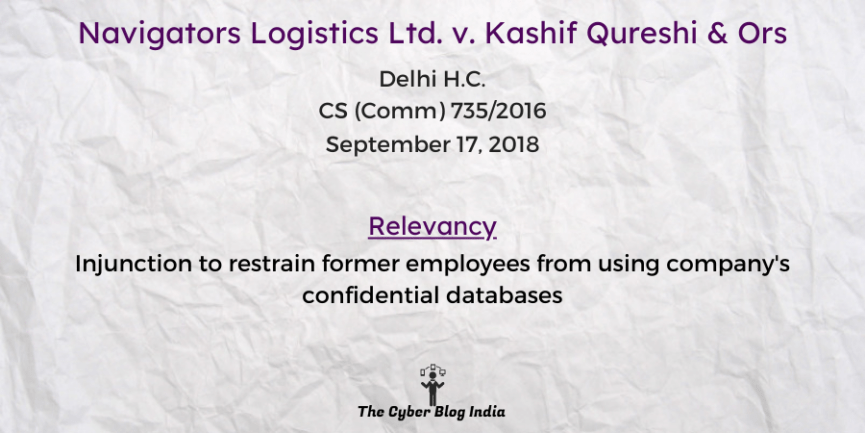Navigators Logistics Ltd. v. Kashif Qureshi & Ors

Navigators Logistics Ltd. v. Kashif Qureshi & Ors
(2018) 254 DLT 307 : (2018) 76 PTC 564
In the High Court of Delhi
CS (Comm) 735/2016
Before Justice Rajiv Sahai Endlaw
Decided on September 17, 2018
Relevancy of the Case: Injunction to restrain former employees from using company’s confidential databases
Statutes and Provisions Involved
- The Indian Contract Act, 1872 (Section 27)
- The Copyright Act, 1957 (Section 2, 13, 17, 27)
- The Constitution of India, 1950 (Article 19)
- The Specific Relief Act, 1963 (Section 41(f))
Relevant Facts of the Case
- The plaintiff has filed this suit against the defendants for stealing confidential copyrighted information. They have taken customer databases, account details, airway drawings, financial information, administrative and organisational information, and trade secrets of the company.
- The plaintiff company claims to have created confidential data, deserving copyright protection under Sections 2(c) and 2(o) of the Copyright Act, 1957.
- The defendants are former employees of the plaintiff, and they signed an agreement when they joined the company. This agreement prohibits them from sharing or disclosing trade secrets, research processes, financial, administrative, and organisational matters.
Prominent Argument by the Adcoates
- The plaintiff’s counsel submitted that the plaintiff owns the copyright under Section 17 of the Copyright Act, 1957. He placed reliance on the Skype conversations and emails among the defendants to establish copyright violation.
- The defendant’s counsel argued that the plaintiff’s counsel failed to establish the author of the copyrighted material. The owner of a copyright has to be a natural person. The primary set of allegations is against client data. Client data contains names, addresses, phone numbers and other information. This is neither an original literary work nor an artistic rendition. The plaintiff’s complaint is vague and baseless.
Opinion of the Bench
- An author must create a piece of literary work using his skill and judgment to receive protection under the Copyright Act, 1957. Copyright cannot exist if there is neither skill nor judgment used in a compilation.
- The author of a literary work must be a natural person and not an artificial person.
- There was no original effort involved in gathering all the customers’ information.
- Further, copyright cannot exist in unpublished work unless the author is an Indian citizen or resident in India at the time of the creation.
- The bench noted the plaintiff’s failure to reveal the original author’s name is the sole reason for a lack of copyright in the stolen data.
Final Decision
- The bench rejected the injunction application. However, the court recognised that they had indeed violated Section 27 of the Contracts Act, 1872.
